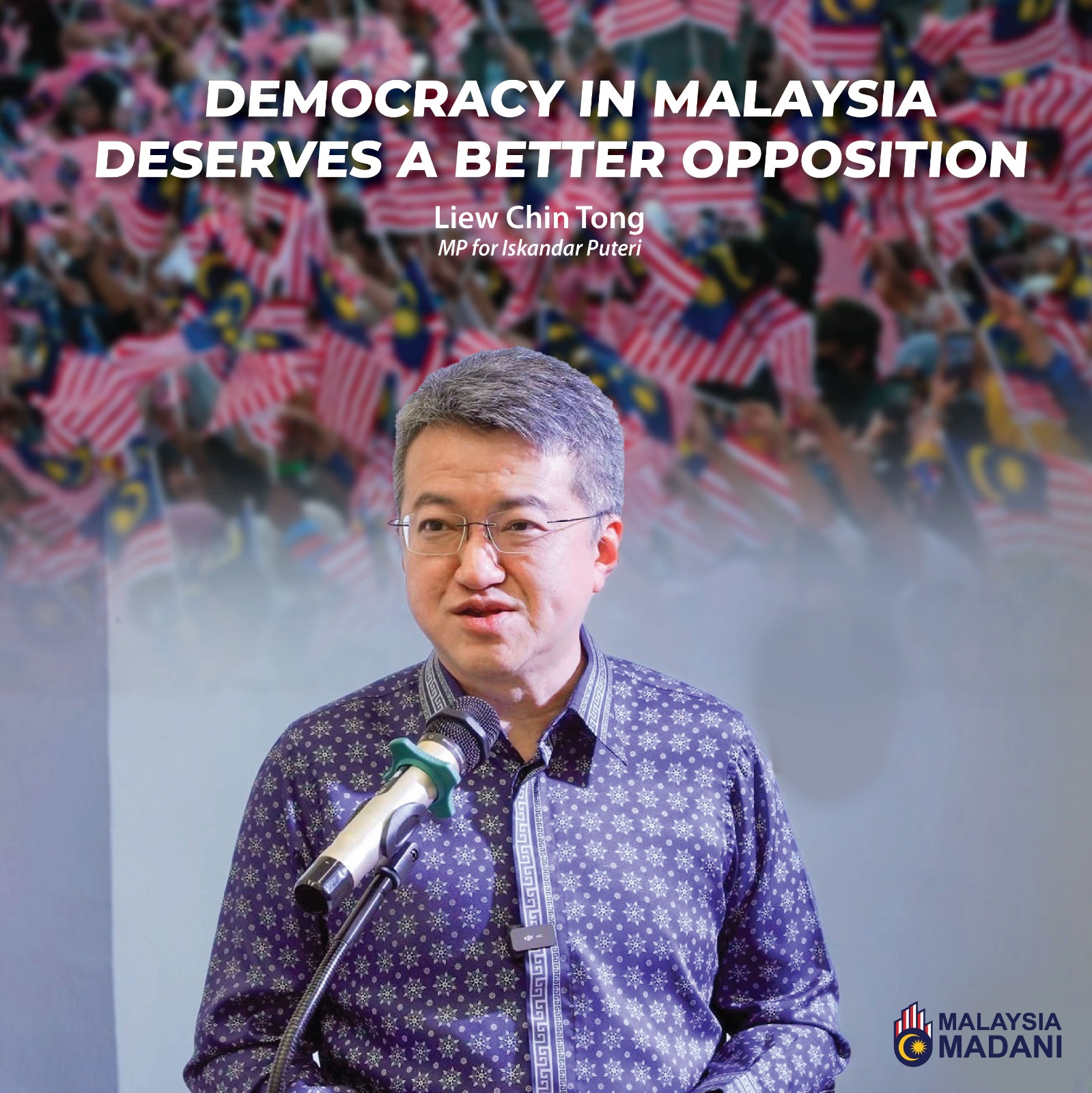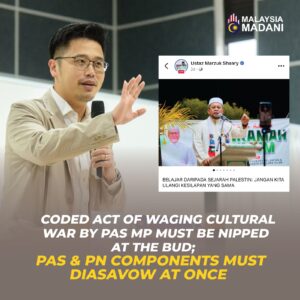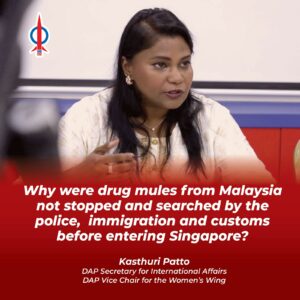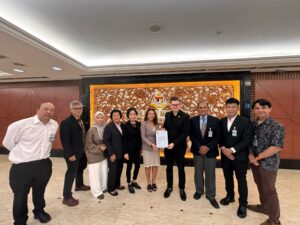
Perikatan Nasional as the opposition coalition with nearly a third of Parliamentary seats actually has a decent chance to provide an alternative to the Anwar Ibrahim’s Unity Government. Yet, without any serious solution to its leadership impasse or a viable game plan for Malaysia, it is not going anywhere.
The 26 July rally at Kuala Lumpur’s Dataran Merdeka trained its guns on Prime Minister Datuk Seri Anwar Ibrahim with the aim of arousing the fighting spirits of Perikatan Nasional’s rank and file despite its lackadaisical leadership.
While this rally led by Bersatu’s Tan Sri Muhyiddin Yassin managed to mobilise a number of people, almost all were core supporters of PAS, failing to attract non-partisan or middle ground members of the public.
To help us understand the broader political context, let’s take a closer look at the PN’s leadership crisis.
Bersatu
PN had a great outing in the November 2022 general election because it gafined an advantage from the three-way split among PN-Pakatan Harapan-Barisan Nasional contests due to the wave of anti-BN sentiment. It meant that conservative UMNO supporters switched votes to PN while PH attracted centrist BN voters.
On 23 February 2020, Muhyiddin conspired with PKR’s Dato’ Seri Azmin Ali to launch a political coup, ending PH’s 22-month-old government. For his short-stint as Prime Minister from March 2020 to August 2021, with UMNO support, some Malays saw Muhyiddin as a credible prime minister, which boosted Perikatan Nasional’s election results in GE15.
After the 2022 general election, following the King’s advice, a unity government was formed between PH, BN, and the parties of Sarawak and Sabah. During the six-states election in August 2023, Azmin kept repeating that had PN won Selangor, Muhyiddin would become prime minister again, in the hope that the positive Muhyiddin effect would still yield votes. Unfortunately, the Muhyiddin effect had faded by then.
Soon after the state elections, I argued that PN had reached its peak, and while PAS would remain strong in its strongholds, Bersatu would struggle internally and have its influence further diminished.
There is nothing that Muhyiddin has done in the past two years that could project him to be the next prime minister for the future generation.
Instead, in PN, among PAS leaders, some want Muhyiddin to step aside, and from within Bersatu, some want Dato’ Seri Hamzah Zainuddin as their new leader.
Lest we forget, Bersatu was formed in September 2016 by Muhyiddin and Tun Dr Mahathir Mohamad to challenge Dato’ Seri Najib Razak’s kleptocracy. After winning together with PH, Hamzah’s UMNO faction was admitted to join Bersatu in 2019 to bolster its numbers in Parliament. During the 2020 Sheraton coup, Mahathir’s faction was ousted from Bersatu while Azmin’s bloc from PKR was admitted.
Until today, these groupings have yet to blend as one. If Muhyiddin were to leave the scene before the next general election, Hamzah the presumptive leader would likely drop Azmin.
Bersatu is now caught in a dilemma: Muhyiddin’s star is dimming in the eyes of the voters while Hamzah lacks the charisma as a prime ministerial candidate. This adds to the anxiety of certain PAS leaders, especially since they have the largest number of seats in Parliament.
PAS
Alternatively, Dato’ Seri Samsuri Mokhtar, the Menteri Besar of Terengganu, certainly appeals to the middle ground as prime ministerial material. However, with the middle-ground being a crucial element to winning and sustaining federal power, whether or not PAS will adopt a moderate position is where his challenge lies.
PAS was formed in 1951 by the breakaway ulama elements of UMNO but its current incarnation came into being at the 1982 𝘮𝘶𝘬𝘵𝘢𝘮𝘢𝘳 which deposed the stewardship of Dato’ Asri Muda, a conservative Malay leader.
From its formation until 1982, PAS was competing with UMNO on who was the best party to represent and protect Malay interests. While the branding was religion, the struggle was very Malay. Hence, some people ridiculed PAS for being a 𝘬𝘢𝘮𝘱𝘶𝘯𝘨 or 𝘭𝘦𝘣𝘢𝘪 party.
By the 1970s, oil-producing Muslim nations were attempting to assert their identity in international affairs amidst the wave of Islamic revivalism among their youth. Domestically, among many emerging youth groups, Anwar-led Angkatan Belia Islam Malaysia (ABIM) was the most prominent.
Following an internal party crisis, PAS lost control of the Kelantan government to the federal emergency rule in 1977, and the subsequent state election in the following year.
Dr Mahathir took office as prime minister in July 1981. Not long before parliament was dissolved for the April 1982 general election, Anwar accepted his invitation to join UMNO and became the party’s face for Islam.
The Asri leadership was deemed too old and out of touch, and the “young Turks” from the Islamic youth movement, especially the late Dato’ Fadzil Noor and Tan Sri Hadi Awang staged a party revolt at the October 1982 𝘮𝘶𝘬𝘵𝘢𝘮𝘢𝘳, bringing about a wholesale change. Although its new president, the late Yusof Rawa, was part of the previous leadership, the newly installed Deputy President Fadzil and Vice President Hadi were the de facto leaders.
The spirit of the 1979 Iranian revolution placed the clergy at the centre of Islamic leadership. From competing previously to be the champion of the Malays, PAS and its arch rival UMNO began to out-Islamise each other, with the idea of the centrality of the ulama becoming some sort of an orthodoxy in PAS.
When Dr Mahathir sacked Anwar from UMNO, BN, and the government altogether in 1998, Fadzil who took over from Yusof as PAS president almost a decade earlier, rode on the anti-Mahathir wave to bring in many young non-ulama leaders, often with impressive credentials or professional background, to prepare PAS to win the Malay middle ground as well as to reach out to the non-Malays. He knew very well that PAS had to win the moderate voters to rule.
Alas, Fadzil passed away in June 2002, and Hadi took over the helm of the party. In June 2015, the conservative transformation was complete when the progressives were kicked out from the party.
Without the progressives, Hadi’s PAS returned to its 1982 roots. While it is most probably unlikely, PAS leaders and members are hoping that Malaysians, be they Muslims or non-Muslims, would one day see the light of their version of truth, and vote for them in elections.
With the ailing Hadi indicating that he would continue to be president in the upcoming party election in September, it will be difficult for PAS to move beyond the 1982 orthodoxy, at least for now.
Samsuri and other PAS leaders who may have some national appeal and understand the importance of the middle ground would have to wait, and at the same time, be on guard to ensure the hardliners in the party would not get rid of them.
The way forward
PN can be a constructive opposition if it wants to. This means working together with the Unity Government via parliamentary processes to serve the people.
Their leaders should know that being the kind of opposition that can only manufacture outrage and anger to manipulate the people’s emotion, especially among the Malays, will not bring the country anywhere.
I remember that a week after the Sheraton Coup in 2020, while many PH supporters were still reeling from the shocking betrayal, Sdr Anthony Loke (who had yet to become DAP Secretary-General) managed to convince DAP MPs to find an amicable solution.
His idea: to stabilise the political situation, work with the incumbent to reach a confidence and supply agreement (which eventually took the form of Memorandum of Understanding with the Ismail Sabri administration), and only after all that, battle it out in the general election.
With Bersatu’s internal splits, and with PAS stuck in its 1982 dogma, and with PN adopting an obstructive posturing with no positive messages, voters will only continue to find it difficult to identify with a fractious opposition.
Democracy in Malaysia deserves a better opposition.



